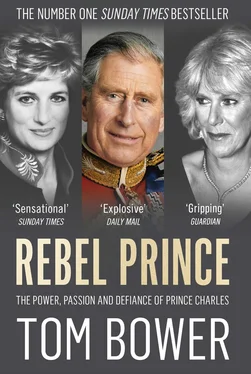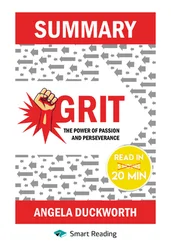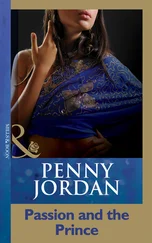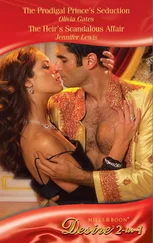At which point, his troubles increased. Five weeks later the Daily Mirror published the transcript of an eight-minute telephone conversation between Charles and his mistress. Millions around the globe listened as he told Camilla how he yearned to ‘live inside your trousers’ and be reincarnated as ‘God forbid, a Tampax, just my luck … to be chucked down the lavatory and go on and on forever swirling round the top, never going down’. Charles fled to Sandringham, hoping never to see a newspaper again. He was, however, unable to escape a Daily Telegraph report that his approval rating had fallen to 4 per cent. Further crises seemed imminent. He lacked even the authority to demand an investigation into who had targeted him. The obvious suspect was a rogue employee at the government’s intercept agency GCHQ who had recycled his work to amateur radio hams.
‘You have to be careful which shadows you decide to chase,’ Diana told Patrick Jephson, her private secretary, to explain why no proper inquiry had been demanded. Like Charles, she suspected that her police protection officers leaked her and Charles’s secrets, especially their adulteries. The police had accumulated considerable influence over the royals, not least after Diana and Princess Anne had affairs with their protection officers. Unethically, other officers had used that information to cultivate lucrative relationships with the media.
Charles stopped talking to journalists in 1993, even during foreign trips. Damaged by the recent revelations, he now repeatedly complained about the lack of safeguards. A senior Downing Street official was summoned to St James’s Palace and asked to ban photographers from around Balmoral, the queen’s fifty-thousand-acre estate in north-east Scotland. ‘There’s not much we can do if you go near the public highway,’ Charles was told. ‘You’ll just have to find somewhere on the estate which they can’t see, even if it’s less attractive.’
That exchange jarred after the news emerged about Charles’s negotiations over an authorised film and biography. Jonathan Dimbleby was the younger son of Richard Dimbleby, the hugely respected BBC journalist and the nation’s trusted commentator on all state occasions until his death in 1965. That pedigree was ignored beyond St James’s Palace. Speaking on behalf of the senior officials in Buckingham Palace, Robert Fellowes had strongly advised Aylard to resist Dimbleby’s offer. After Charles made his enthusiasm plain, the queen was advised to intercede. As usual, she replied that Prince Philip should be asked for his opinion; together they decided not to interfere.
Their reluctance stemmed from the breakdown in relations with their son. Charles had publicly blamed his parents, particularly Philip, for an unloving childhood and being forced into an unhappy marriage. In graphic terms, he saw his father as an emotional gangster. He wanted to appeal through Dimbleby for the public’s sympathy. To present Charles’s point of view, Dimbleby was given unprecedented access to his private papers, his friends and employees, and extensive interviews with Charles himself.
Controversy, the prince knew, was inevitable. While reading the proofs of Dimbleby’s book during a trip on the royal yacht Britannia , he regularly shouted his protests to Aylard, who in turn negotiated changes with Dimbleby – who, as he sympathised with Charles’s predicament, was usually receptive. But no one ever sought to stop publication. The result was a remarkably intimate but ultimately destructive profile.
Dimbleby presented a portrait of a vulnerable, friendless forty-six-year-old, still bearing the scars of his harsh school years at Gordonstoun. In the journalist’s graphic description, Charles never understood close companionship between schoolboys or the mutual reliance that existed among friends. Immune to the social revolution of the sixties, he resented his peers for not appreciating or understanding him.
At Cambridge he remained ‘the prince’, denying himself any relationship between equals. Nurtured to believe in his superiority, he became intolerant of criticism and refused to accept blame. Speaking to Dimbleby may have provided some therapy to relieve his demons, but by exposing his limited self-confidence he showed himself as self-destructive, thin-skinned and over-eager to find fault with others, especially his parents.
As a young man, Charles had craved a spiritual guide. He found one in Laurens van der Post, the South African explorer, writer and somewhat eccentric philosopher. Employing mystical terms, van der Post offered the young Charles a voyage of self-discovery and a comfortable port by telling him that, despite his possibly limited time as king, he could prove his greatness as Prince of Wales. Inspired by van der Post’s lectures about African tribesmen, environmental pollution and the benefits of complementary medicine, Charles developed a ragbag of beliefs linking mysticism, divine powers, geometric measurements, orthodox Christianity and Islam.
Dimbleby’s book revealed other impolitic principles. Previously, the public had been unaware that the heir to the throne was not a conventional Anglican. One single sentence threatened centuries of British stability. As monarch, Charles told Dimbleby, he would prefer to be ‘defender of faith rather than of The Faith’. The Church of England and constitutional experts alike were disturbed by his doubt about swearing the traditional coronation oath to protect the Protestant settlement of 1701. There were now not one but two religious objections to Charles succeeding.
In Dimbleby’s television documentary, the aspiring king pleaded for understanding. ‘It’s not a holiday, you know,’ he said to camera. ‘It’s all so difficult … I can’t describe the horror of seeing your life set in concrete.’ Instead of offering himself as a visionary leader, he came across as a picture of harassed weakness. As he rambled on, with a series of eye-rolling expressions, grimaces and scowls, his audience was left perplexed. ‘Who are you?’ he was asked by a child in the documentary. ‘I wish I could remember,’ he had replied.
In preparation for the programme, uppermost in the TV producers’ thoughts had been ‘the Camilla question’. The relationship had never been officially confirmed. After some discussion, Charles believed that a confession would ‘clear the decks’. Dimbleby’s enquiry about his marriage was straightforward: ‘You were, because of your relationship with Camilla Parker Bowles, from the beginning persistently unfaithful to your wife and this caused the breakdown?’ Instead of briefly expressing his regret, Charles replied, ‘I was faithful until it was clear to me that my marriage had irretrievably broken down.’ He then admitted his adultery, denied that he was considering divorce, and insisted he would be king. Royalist newspapers proclaimed that Charles had ‘willingly cooperated in [his] own destruction’. The Sunday Times headline for its serialisation of Dimbleby’s book summarised its central message: ‘Charles: My Agony’.
The public was aghast. Soon after publication he made a ceremonial return to Caernarvon, where twenty-five years earlier a global TV audience had watched his investiture as Prince of Wales. Just days after his televised confession, Charles drove through the town’s empty streets; local television did not interrupt its coverage of racing from Sandown Park.
In hindsight, Dimbleby’s highlighting the facts about Charles’s marriage had in one way been a blessing, forcing the pace for his divorce. But while Charles may have settled the score, he had prepared the way for far-reaching repercussions that he could never have anticipated.
The battle with Diana had revealed the woeful mismanagement of the royal family by the queen as well as by Charles’s senior advisers. The prince’s relationships with his private secretaries had always been fractious. Aylard, appointed in 1992, was his fourth in seven years. Edward Adeane had resigned in 1985 after a row about Charles’s uncontrollable love of controversy; John Riddell, a genial businessman who was appointed in 1985, laughed about the chicanery of courtiers and cursed the shambles of Charles’s lifestyle. ‘Every time I made the office work,’ Riddell observed, ‘the prince fucks it up again. He comes in, complains that his office is “useless” and people cannot spell and the world is so unfair, and then says, “This is part of the intolerable burden I put up with. This incompetence!”’ Such outbursts manifested the prince’s intolerance rather than a desire for perfection. After Riddell resigned five years into the job, Charles refused to award him the customary knighthood, an omission later rectified by the queen. ‘Charles would be fantastic as a second-hand-car salesman,’ Riddell told a colleague. ‘He has the right enthusiasm and conviction to sell. Then you remember he’s heir to the throne.’
Читать дальше












